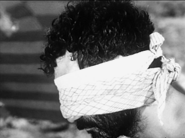Part social realism in its searing depiction of the plight of the underprivileged against the transforming economy of an increasingly modernized Turkey, and part poetic essentialism in its psychological portrait of a desperate man succumbing to the mania of a delusive, blind faith, Yilmaz Güney and Serif Gören’s Umut (Hope) captures the precarious atmosphere of a nation at a political and economic crossroads. The cultural climate of transformation and renewal is prefigured in the film’s opening montage – an impromptu city symphony created by the early morning rituals of road washing trucks, sidewalk sweepers, street vendors, billboard gazers (not coincidentally, all advertising banking institutions), and waiting taxicabs that play out against a dozing Cabbar (Yilmaz Güney), an uneducated cart driver waiting in the wings of a station for commuters to arrive at the terminal. Immediately, the passengers’ selected mode of transportation reveals an intrinsically bifurcated society, as people wearing modern, Western attire make their way towards a row of idling taxis, while people dressed in traditional clothing invariably board horse-drawn carriages lining the front of the station…that is, all except for Cabbar’s shabby and woefully old-fashioned cart. Already leading a hardscrabble existence as the family’s sole provider – one that includes five children whose financial demands for school expenses and playful whims are often weighed against the more fundamental needs of having enough food to eat and proper health care for an elderly parent – and plagued by compounding debts that have accumulated in the course of establishing (and maintaining) his out of fashion livelihood, his situation takes a further turn for the worse when a roadside accident delivers a tragic, final blow to his already struggling enterprise. Left without a means of earning a living, Cabbar follows the advice of his unemployed friend, Hasan (Tuncel Kurtiz) and seeks guidance from Hüseyin Hodja (Osman Alyanak), a mystical imam and village faith healer who would soon lead him away from his family in search of an elusive, ever-shifting panacea amidst the desolation and rubble of a parched, forgotten land.
In a way, Umut may be seen as an adumbration of Djibril Diop Mambéty’s Le Franc in its cautionary tale of an insoluble debt that has metastasized into a vicious circle of delusion and gullibility, and the parasitic dependency created by institutionalized, arbitrary, windfall mechanisms that systematize poverty and disenfranchisement. This moral passivity (and consequently, victimization) is introduced in the establishing images of Cabbar: initially, through an incisive shot that frames a wash truck approaching his cart as he sleeps in the foreground, figuratively washing him away, in his oblivion, from the streets in the automated sweep of modernization; then subsequently, from his repeated requests to check his lottery ticket at a newsstand against the day’s winning numbers, unable to read the posted numbers on the newspaper himself. At each instance, Cabbar’s daily ritual is presented against undermining acts of intervention that render his apparent self-reliance an illusion. Visually, Güney and Gören reflect this rupture between perception and reality through the jarring juxtaposition of interstitial, highly formalized, chiaroscuro landscape shots (often resembling cutout animation) against rough hewn, neorealistic images of struggle and despair. Moreover, Cabbar’s decision to follow Hodja’s visions also represents a conscious, if unwitting, disempowerment in lieu of direct action and sociopolitical engagement: a rejection that is also suggested in his recusal from a planned cart driver strike, citing the confiscation of his vehicle. In essence, Cabbar’s relegation of destiny into the hands of impotent fate reveals an underlying social schism – a division that is implied in the foreshadowing shot between modernity and tradition at the station – that, in turn, exposes the folly of inaction. Concluding with the image of a blindfolded Cabbar aimlessly turning in circles to divine his fortune, Umut illustrates that despair lies, not in the absence of hope, but in its hollow, inert persistence.
© Acquarello 2008. All rights reserved.
